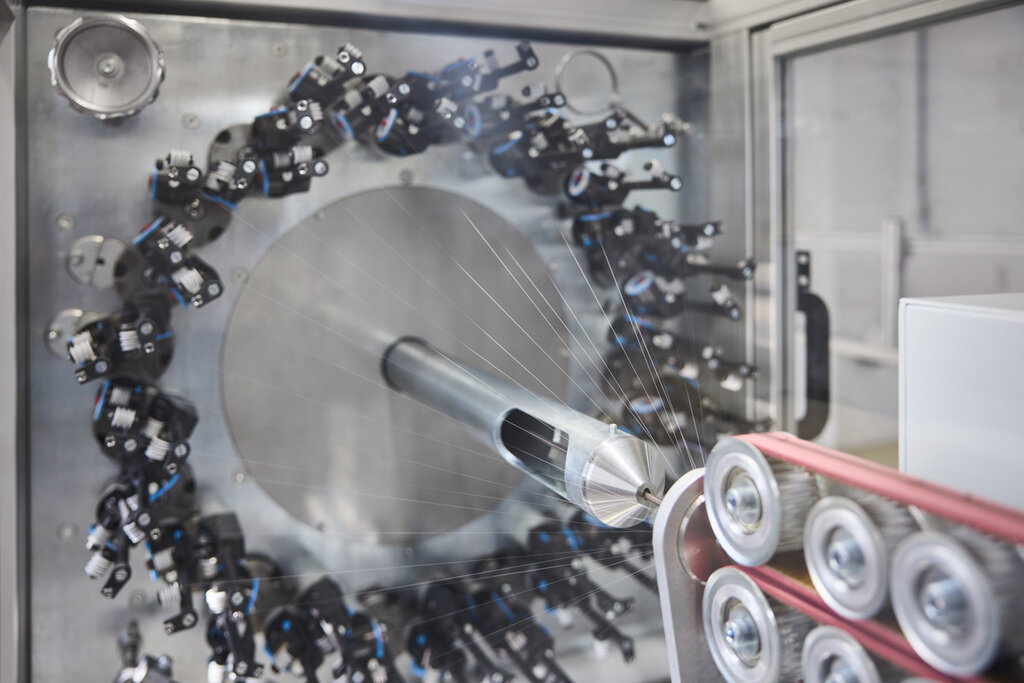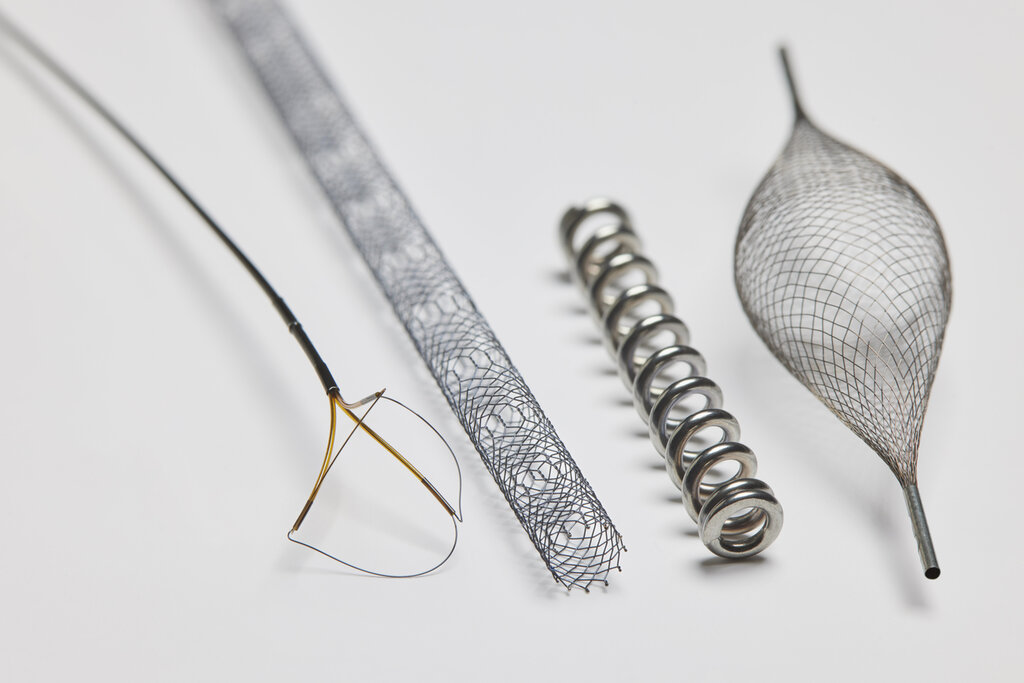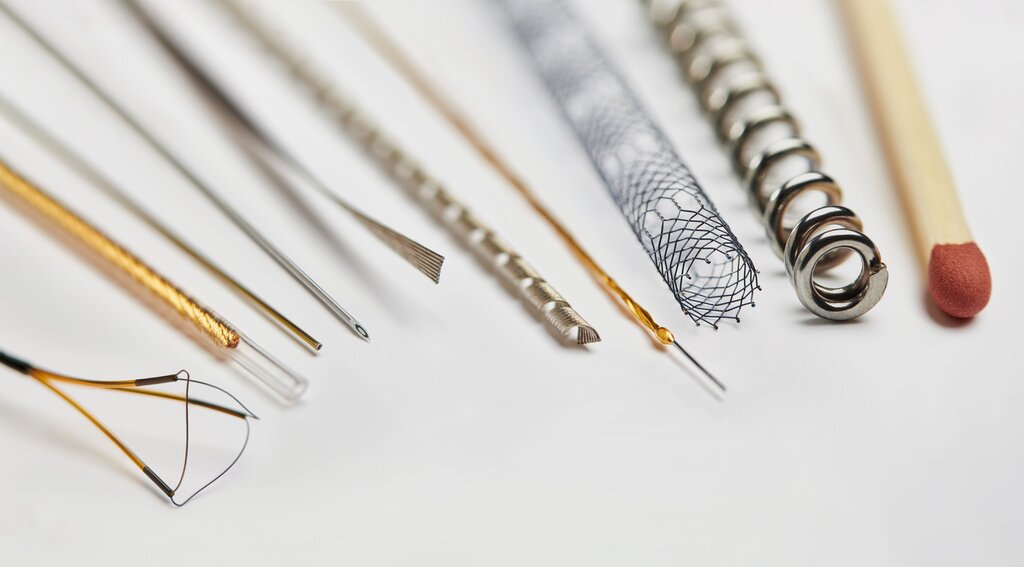Company Insight
Sponsored by Alleima
Nitinol’s key role in medical devices of the future
With its unique combination of super-elasticity, shape memory, and biocompatibility, this "smart" alloy of nickel and titanium is driving innovation in medical devices.
Main image: Filters are among the nitinol wire-based solutions that Alleima manufactures in its facility in Germany. Credit: Alleima

Dr. Bernd Vogel
Asmart alloy composed of roughly equal parts nickel and titanium that is renowned for its super-elasticity and thermal-shape memory, nitinol is increasingly vital to the development of both implants and surgical instruments – enabling more advanced, minimally invasive procedures. Unlike other materials, the super-elasticity properties enable nitinol to return to its original shape even after significant deformation, which is a cornerstone feature for devices such as breast tissue markers, embolic protection devices, guidewires, and stone retrieval baskets that demand flexibility and precision.
As medical technologies continue to evolve, nitinol's unique properties make it a critical material for the next generation of medical devices with considerable versatility and biocompatibility. Despite concerns over nickel, the protective titanium oxide layer prevents adverse reactions, making nitinol ideal for permanent medical devices.

Braiding is one of Alleima’s core capabilities in nitinol processing. Others include laser-cutting, shaping, grinding, joining, and cleanroom assembling. Credit: Alleima
Nitinol's versatility has led to its use in a wide array of medical devices. In addition to guidewires, nitinol is used in flexible retrieval devices and instruments, vascular filters, and permanent implants. These devices benefit from nitinol's ability to endure repeated stress without losing shape or performance. Nitinol’s adaptability allows it to be crimped, bent, or coiled into tight configurations, easing insertion through minimally invasive methods. In cardiovascular treatments, nitinol filters capture blood clots and prevent embolisms. These filters collapse for deployment and expand inside blood vessels to perform life-saving functions. Nitinol is also promising in steerable medical devices like endoscopes and catheters.
However, manufacturing nitinol in a cost-effective way while maintaining the highest quality requires specialist capabilities. Even the slightest deviation during production can alter the performance of the material. Understanding the impact of cold work, heat treatment, strain rate, and number of cycles is essential for optimizing the stress-strain behavior of nitinol.

With over 20 years of experience in processing nitinol Alleima supports customers in developing complex nitinol solutions used in life-changing medical devices. Credit: Alleima
Having acquired long-standing nitinol expertise with Endosmart in 2022 and Endox in 2024, Alleima combines decades of expertise in material science with leading know-how in nitinol processing, delivering wire-based solutions and medical components designed to meet the exacting demands of modern surgery. Whether it’s developing steerable devices for robotic surgery or advanced, flexible instruments and implants for various applications, including urology, gastroenterology, oncology or cardiovascular, Alleima’s collaborative approach ensures its clients can navigate the complexities of nitinol manufacturing with ease, highest quality, and functionality of its solutions all the way to market approval.
In a field where every innovation can translate into saved lives and improved patient outcomes, access to expert knowledge is invaluable. To learn more about Alleima's engineering services and processing capabilities in nitinol, visit their website, Nitinol—shaping the future—Alleima, where you can also download their nitinol whitepaper Nitinol and its transformative role in medical devices.

Dr. Bernd Vogel
When asked to simply describe the shape-memory effect, Dr. Bernd Vogel takes out a wire shaped like a heart, straightens it completely, and then slowly dips it into a cup of hot coffe. Immidately the wire returns to its perfect heart shape.

Braiding and Twisting detail center. Credit: Alleima
Lumpectomy surgeries are less invasive, removing less breast tissue and leaving minimum scarring. The U.S. National Institutes of Health released a statement back in 1990 stating that a lumpectomy followed by radiation was preferred over mastectomy to treat early-stage breast cancer, and current studies indicate that this is still the case.
A future powered by innovation and sustainability
The medical device industry is poised for extraordinary advances, driven by technology and a commitment to better healthcare outcomes. Alongside this, environmental, social, and governance (ESG) considerations are becoming mandatory across industries, including medical devices. With regulations tightening, companies must prioritize sustainable manufacturing practices, efficient resource usage, and waste reduction. Medical devices often rely on single-use plastics and energy-intensive production methods, making sustainability an urgent challenge.
Companies at the forefront of changes will be those that adapt quickly, leveraging innovation and sustainability to meet shifting market demands. With its legacy of materials expertise and commitment to progress, Alleima is a vital partner for businesses navigating this dynamic landscape.

Alleima's expertise in high-performance materials and complex solutions is critical for designing and developing diagnostic and therapeutic devices used in precision medicine. Credit: Alleima
Alleima's expertise in high-performance materials and complex solutions is critical for designing and developing diagnostic and therapeutic devices used in precision medicine. For example, the company’s corrosion-resistant alloys and wire solutions support the manufacturing of life-changing devices such as implants, neurostimulators, pacemakers, catheters, and biosensors, which are integral to personalized treatments. Alleima’s advanced capabilities and solutions are also integral in creating flexible instruments used in robotic surgeries that withstand the rigorous demands of medical procedures.
When it comes to green manufacturing, Alleima has been recognized with the prestigious EcoVadis Gold Award for outstanding sustainability practices for prioritizing the use of recycled materials, reducing waste, and ensuring a consistent supply of high-quality raw materials. Furthermore, Alleima also uses electric furnaces and biogas fuel to make production more energy efficient.
As the industry evolves, collaboration across the value chain will be essential. By embracing emerging trends and investing in forward-thinking solutions, stakeholders can ensure a healthier, more sustainable future.
For more information on Alleima’s capabilities, visit their website www.alleima.com/medical.
Contact information
Alleima Advanced Materials
1 Commerce Blvd.,
Palm Coast, FL, 32164,
United States
Tel: +1 386 445-2000
Fax: +1 386 447-5113
Email: sales.pc@alleima.com
Alleima Sonceboz
Sur le Brassiège 3
2605 Sonceboz-Sombeval
Switzerland
Tel: +41 32 942 39 20
Email: sales.sb@alleima.com
Alleima Karlsruhe
Wilhelm-Schickard Str. 9c
761 31 Karlsruhe
Germany
Tel: +41 41 761 63 55
Email:sales.ka@alleima.com
Endox
Paul-Lechler-Str.14
72581 Dettingen/Erms
Germany
Tel: +49 7123 91019-0
Email: info@endox-technik.de